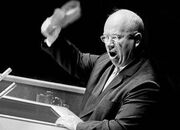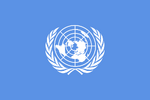The United Nations is an international peacekeeping organization established in October 24, 1947 after the United Nations Charter, signed by the Heads of State of multiple founding nations was signed on June 26, went into effect and officially established the group. The United Nations has overseen the relatively peaceful era of humanity that has existed since the end of the Fifth Global War in 1947. Born out of the former League of Nations, established after the Treaty of the Winter Palace in 1919, the organizations primary role in the world is the peaceful ending of conflicts both between member states, and with them. The United Nations has made it a goal to progress the development of global issues, such as international law and security, global economic development, human rights, social progress, and, above all, world peace. The organizations comprises of multiple subsidiaries to solve global problems, and comprises of two main bodies, the General Assembly and the Security Council.
Made of every single internationally recognized nation in the world besides Vatican City, its resolutions lack a single body of enforcement, but rather require multilateral efforts to be acted out. Four other principal bodies in the organisation includes the Economic and Social Council, the Secretariat, the International Court of Justice, and the United Nations Trusteeship Council. Each serving a variety of different roles from administering the economics of the organisation to the managing of international justice and law. The current head of the United Nations, holding the title of Secretary-General is Korean diplomat Ban Ki-Moon, while different administrative heads run the subsidiaries that create a majority of the organization, although a small part of its power.
Current United Nations projects include multiple missions to recently independent African countries to assist them with foreign aid to build democracy and social justice across the freed continent. Sanctions have currently been established on pariah nations across the world such as Argentina, which is currently undergoing a civil uprising, and has ignored multiple stops by larger powers to stop the government crackdown on pro-democracy protesting citizens.
United Nations International Headquarters[]
The United Nations Secretariat Building was built in International Territory in New York City from 1949-1954, and

United Nations International Headquarters, with Secretariat Building (left), Conference Building (bottom right), and Library (center bottom)
upon completion has 39 stories. It was designed by Brazilian architect Oscar Niemeyer and French architect Le Corbusier, and currently houses the many administrative offices that make the organization function.
The Conference Hall is the main building of the sight and houses the General Assembly Hall, in which representatives of every nations have an ambassador to represent them on international issues. It's also home to the United Nations Security Council Meeting Hall, where the representatives of 15 member nations meet.
Organization[]
General Assembly[]
The General Assembly is the main legislative body of the United Nations, which passes general resolutions determining the organization's stances on political events, and its reactions to world occurrences. All member nations of the United Nations have equal representation in the group's principal organ, each being allowed one representative at each meeting. It is a place for every member state to voice its opinion on world events and to debate subjects of varying magnitude with the representatives of other nations. It oversees the budgeting of all other organs of the United Nations, and is made to be a non-partisan area where the nations of the world come to work out their differences.
Every two years the General Assembly elects non-permanent members of the United Nations Security Council, and elects the Secretary-General with recommendation by the Security Council. It elects members of the United Nations Economic and Social Council, the United Nations Industrial Development Organization, and and some of the members of the United Nations Trusteeship Council. The organ also adopts rules governing the management and administration of the United Nations Secretariat.
The agenda for a meeting of the General Assembly may be predetermined almost seven months prior to the meeting's actual date. Because much of the United Nations is made of developing nations, the form much of what the group's agenda discusses, and of what the resolutions it makes affects. Because of each state only receiving one vote, roughly eight percent of the world's population can pass a vote that only requires a two-thirds vote. While the technical power is held equally by each member state, the great powers who had a large hand in its creation still hold great sway in the organization via local power blocs and simple politics.
Over the years the General Assembly has seen many political figures make ardent stances, politicized speeches, and it has seen the rise and fall of entire superpowers. It saw West Russian President Nikita Khrushchev give a staunchly anti-Japanese speech screaming the words "We will bury you!" in 1956. In 1964 Che Guevera, a Cuban political activist gave his speech against the communist establishment in South America. And more recently in 2006 when Socialist President of Venezuela, Hugo Chavez, gave a speech before the

Khrushchev banging his show during a speech
General Assembly on American foreign policy, which although receiving resounding applause from the crowd, was heavily criticized by multiple heads of state afterwards. But regardless of any dictators that have spoken before it, the General Assembly has often been seen as an incorruptible representative body to many and an oppresive force of superpowers to some.

